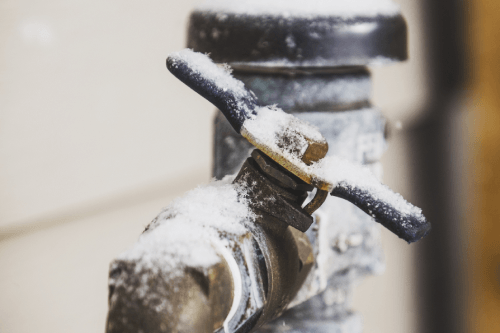Tips to Keep Your Pipes from Cold Weather Issues: Crucial Advice
Tips to Keep Your Pipes from Cold Weather Issues: Crucial Advice
Blog Article
The writer is making a number of great pointers regarding How to prepare your home plumbing for winter weather overall in this post followed below.

Cold weather can ruin your pipes, especially by freezing pipelines. Here's just how to avoid it from happening and what to do if it does.
Intro
As temperatures decline, the danger of icy pipes rises, potentially bring about expensive repair services and water damages. Comprehending just how to avoid icy pipes is important for home owners in cold environments.
Prevention Tips
Shielding vulnerable pipes
Cover pipelines in insulation sleeves or make use of warmth tape to protect them from freezing temperatures. Concentrate on pipelines in unheated or exterior areas of the home.
Heating strategies
Maintain interior areas properly heated, particularly areas with plumbing. Open cupboard doors to enable warm air to distribute around pipes under sinks.
Just how to recognize icy pipelines
Try to find reduced water circulation from faucets, unusual smells or sounds from pipelines, and noticeable frost on revealed pipes.
Long-Term Solutions
Structural adjustments
Take into consideration rerouting pipelines away from exterior wall surfaces or unheated areas. Include additional insulation to attics, cellars, and crawl spaces.
Updating insulation
Invest in high-grade insulation for pipelines, attics, and wall surfaces. Proper insulation aids maintain regular temperature levels and decreases the threat of frozen pipelines.
Safeguarding Exterior Plumbing
Garden tubes and outdoor taps
Disconnect and drain yard pipes prior to winter season. Set up frost-proof faucets or cover outdoor faucets with protected caps.
Recognizing Frozen Pipes
What triggers pipelines to ice up?
Pipelines freeze when subjected to temperature levels below 32 ° F (0 ° C) for expanded periods. As water inside the pipes ices up, it broadens, taxing the pipe walls and potentially causing them to rupture.
Dangers and damages
Frozen pipes can cause water disruptions, residential property damages, and costly repair services. Ruptured pipes can flood homes and create considerable structural damage.
Signs of Frozen Piping
Recognizing frozen pipes early can stop them from rupturing.
What to Do If Your Pipes Freeze
Immediate activities to take
If you presume frozen pipelines, maintain faucets available to alleviate stress as the ice melts. Make use of a hairdryer or towels taken in hot water to thaw pipelines slowly.
Final thought
Avoiding icy pipes calls for proactive steps and fast reactions. By recognizing the causes, indications, and safety nets, property owners can shield their plumbing during winter.
Helpful Tips to Prevent Frozen Pipes this Winter
UNDERSTANDING THE BASICS: WHY PIPES FREEZE AND WHY IT’S A PROBLEM
Water freezing inside pipes is common during the winter months, but understanding why pipes freeze, and the potential problems it can cause is crucial in preventing such incidents. This section will delve into the basics of why pipes freeze and the associated problems that may arise.
THE SCIENCE BEHIND FROZEN PIPES
When water reaches freezing temperatures, it undergoes a physical transformation and solidifies into ice. This expansion of water as it freezes is the primary reason pipes can burst. As the water inside the pipe freezes, it expands, creating immense pressure on the walls. If the pressure becomes too great, the pipe can crack or rupture, leading to leaks and water damage.
FACTORS THAT CONTRIBUTE TO PIPE FREEZING
Low Temperatures: Extremely cold weather, especially below freezing, increases the risk of pipes freezing. Uninsulated or Poorly Insulated Pipes: Pipes located in unheated areas, such as basements, crawl spaces, or attics, are more prone to freezing. Insufficient insulation or lack of insulation altogether exacerbates the problem. Exterior Wall Exposure: Pipes running along exterior walls are susceptible to freezing as they encounter colder temperatures outside. Lack of Heating or Temperature Regulation: Inadequate heating or inconsistent temperature control in your home can contribute to frozen pipes. PROBLEMS CAUSED BY FROZEN PIPES
- Pipe Bursting: As mentioned earlier, the expansion of water as it freezes can cause pipes to burst, resulting in significant water damage.
- Water Damage: When pipes burst, it can lead to flooding and water damage to your property, including walls, ceilings, flooring, and personal belongings.
- Structural Damage: Prolonged exposure to water from burst pipes can compromise the structural integrity of your home, leading to costly repairs.
- Mold and Mildew Growth: Excess moisture from water damage can create a favorable environment for mold and mildew growth, posing health risks to occupants.
- Disrupted Water Supply: Frozen pipes can also result in a complete or partial loss of water supply until the issue is resolved.
WHY CERTAIN PIPES ARE MORE PRONE TO FREEZING
- Location: Pipes located in unheated or poorly insulated areas, such as basements, crawl spaces, attics, or exterior walls, are at higher risk of freezing.
- Exterior Pipes: Outdoor pipes, such as those used for irrigation or exposed plumbing, are particularly vulnerable to freezing as they are directly exposed to the elements.
- Supply Lines: Pipes that carry water from the main water supply into your home, including the main water line, are critical to protect as freezing in these lines can affect your entire plumbing system.
- Underground Pipes: Pipes buried underground, such as those connected to sprinkler systems or outdoor faucets, can be susceptible to freezing if not properly insulated.
https://busybusy.com/blog/helpful-tips-to-prevent-frozen-pipes-this-winter/

We had been made aware of that article about Winter Plumbing Precautions: Preventing Frozen Pipes through an associate on another web blog. For those who liked our post if you please consider to share it. We value reading our article about How To Avoid Freezing Pipes.
Schedule Now Report this page